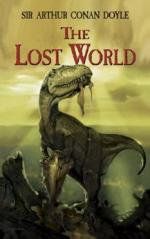So now you will understand, my dear Mr. McArdle, how this communication reaches you, and you will also know the truth, in case you never hear again from your unfortunate correspondent. To-night I am too weary and too depressed to make my plans. To-morrow I must think out some way by which I shall keep in touch with this camp, and yet search round for any traces of my unhappy friends.
CHAPTER XIII
“A Sight which I shall Never Forget”
Just as the sun was setting upon that melancholy night I saw the lonely figure of the Indian upon the vast plain beneath me, and I watched him, our one faint hope of salvation, until he disappeared in the rising mists of evening which lay, rose-tinted from the setting sun, between the far-off river and me.
It was quite dark when I at last turned back to our stricken camp, and my last vision as I went was the red gleam of Zambo’s fire, the one point of light in the wide world below, as was his faithful presence in my own shadowed soul. And yet I felt happier than I had done since this crushing blow had fallen upon me, for it was good to think that the world should know what we had done, so that at the worst our names should not perish with our bodies, but should go down to posterity associated with the result of our labors.
It was an awesome thing to sleep in that ill-fated camp; and yet it was even more unnerving to do so in the jungle. One or the other it must be. Prudence, on the one hand, warned me that I should remain on guard, but exhausted Nature, on the other, declared that I should do nothing of the kind. I climbed up on to a limb of the great gingko tree, but there was no secure perch on its rounded surface, and I should certainly have fallen off and broken my neck the moment I began to doze. I got down, therefore, and pondered over what I should do. Finally, I closed the door of the zareba, lit three separate fires in a triangle, and having eaten a hearty supper dropped off into a profound sleep, from which I had a strange and most welcome awakening. In the early morning, just as day was breaking, a hand was laid upon my arm, and starting up, with all my nerves in a tingle and my hand feeling for a rifle, I gave a cry of joy as in the cold gray light I saw Lord John Roxton kneeling beside me.
It was he—and yet it was not he. I had left him calm in his bearing, correct in his person, prim in his dress. Now he was pale and wild-eyed, gasping as he breathed like one who has run far and fast. His gaunt face was scratched and bloody, his clothes were hanging in rags, and his hat was gone. I stared in amazement, but he gave me no chance for questions. He was grabbing at our stores all the time he spoke.




